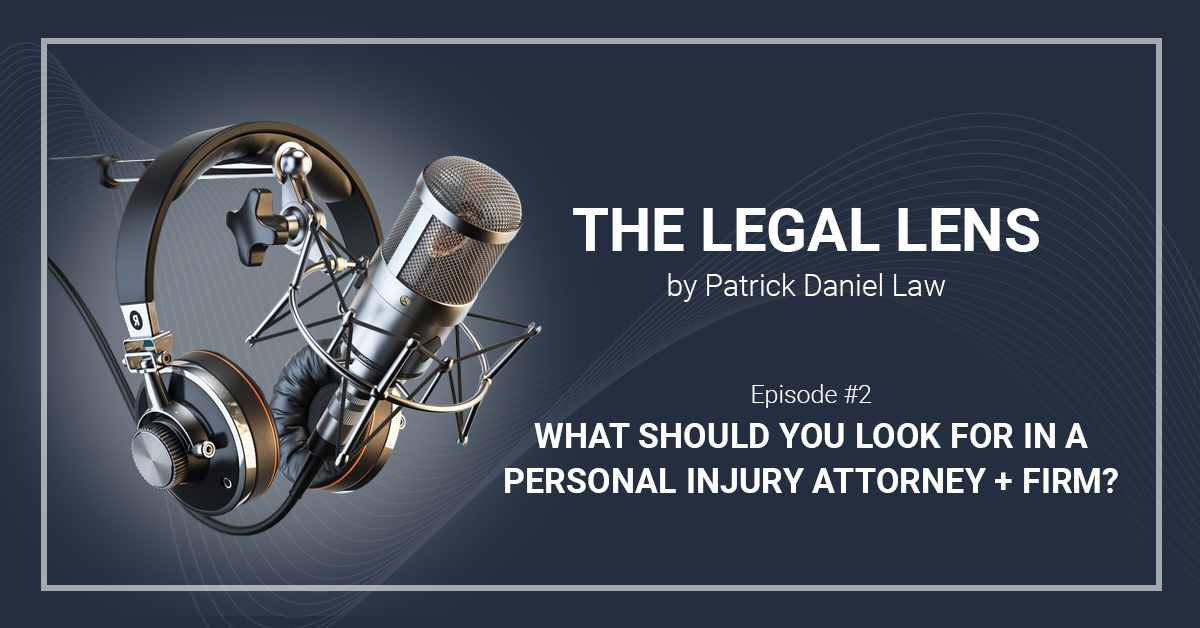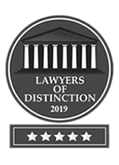
You are listening to The Legal Lens, a podcast for those who thirst for knowledge and insight into the world of personal injury law. Preeminent law firm Patrck Daniel Law believes knowledge is power, and experience is the highest form of knowledge.
Join attorneys Patrick Daniel and Randy Canche as they share their expertise and experience to empower you to make the best decisions when dealing with personal injury matter. Each week, we answer top, frequently-asked legal questions and interview selective experts on an array of topics that matter to you.
Nicolette: Welcome back to another episode of “The Legal Lens,” a Patrick Daniel Law podcast. My name is Nicolette Daniel, and today we will be discussing what you should look for in a personal injury firm and an attorney. So can you tell our listeners, say, what is personal injury law and what’s, like, the difference between, like, “I need a lawyer,” how do I know I need a personal injury lawyer?
Patrick: So I would start with have you been in an accident and have you been hurt? And one of the biggest problems that I find with people that call as a potential new client is they call going, “I’ve been aggrieved. I’ve been X. I’ve been Y.” “Are you hurt?” “No.” Well, I’m not really sure why you’re calling at that point.
You have to understand that there are different firms that do different things, okay? And I’m not trying to tell anybody not to call in or call an attorney. But you have to kind of compartmentalize and understand that just like a heart surgeon doesn’t do foot work, we and other firms specialize in certain areas of the law. However, our philosophy and motto is if I can’t find you somebody to help you…I mean, excuse me, if we can’t help you, I’ll find you someone who can. I’ve always been like that.
But you also have to understand that you’ve really got to compartmentalize what’s going on with respect to the accident. Because if you call a personal injury firm that doesn’t do the property damage component of an auto claim, you can’t be upset. What they’re going to try to do at least is what we try to do is get you to somebody that does do property damage.
For example, there’s a friend of mine I know that they don’t do any PI, but all they do is bad faith insurance coverage. And as a consequence, those are the types of people that we can refer you to. And you’ve really got to think about what do I ultimately want out of this process?
Nicolette: Can I ask a question right away? Like, sorry to jump in, but do you think that, like, some attorneys, because I know how we do it here, but do you think some attorneys are just going to sign you up anyways? So they’re like, because this is about bad attorneys, right?
Randy: Yeah.
Nicolette: So do you think they’re just going to be like, “Yeah, I got property damage. I did well in that class.” Never done a case ever.
Randy: Yeah, it happens all the time, especially with the lawyers that tend to refer cases to us. To be fair, I hate to say this to other lawyers, but there are some shitty lawyers out there are not very smart. There are some firms that they just sign up every damn case without taking a look at how good of a case it is, and then we have to come in and clean up all their crap.
I think that at the end of the day, what a personal injury firm should be doing is taking a look at what your injuries are, how bad they are, and what we can do, how at fault the parties involved in the case are, and how much money we can get for you, how we can put you on a better foot based upon the injuries we have.
That takes skill. But the biggest thing I’ll say in my speech that I give to all my friends at dinner, you meet someone at a cocktail party, you’re out partying, whatever it is. When the accident happens, for the love of God and Jesus and Moses and the apostles, fucking call a lawyer right away. There’s a reason why we’re on call here at the firm 24/7/365, on weekends, because it’s important.
The biggest screw-up people make is they will be in an accident and they’ll wait several days or, “I don’t want to sue,” yada yada yada, and then you end up shooting yourself in the foot.
Nicolette: Why is that a screw-up?
Randy: Because if there’s a delay, let’s say that there is a…it’s an auto defect case, and you delay two weeks, and the insurance company destroys the vehicle. You’ve just screwed yourself out of millions of dollars because now we have no product on a product liability case.
Patrick: Well, tell them what an auto defect case is so they know…
Randy: Auto defect…
Patrick: Which is this is one of the things that…
Nicolette: Because my brain just was like, “Nah…”
Randy: This is one of the things that people are going to have to understand.
Patrick: Sure, sure.
Randy: I think this podcast is about is it’s about explaining the different case types, because people don’t necessarily understand they have a case.
Patrick: Yeah.
Randy: Again, it does kind of circle back to what we said originally. Are you hurt?
Patrick: Sure.
Randy: If you’re hurt, a good attorney, chances are better than not, is going to find a viable cause of action to sue on. Not because we’re ambulance chasers, but because I don’t think accidents fucking happen. I think somebody’s always wrong.
Patrick: Yeah, that’s true.
Randy: You know, hopefully it’s not you, but if it is you, I’m going to also tell you that. I don’t tell you what you want to hear. I’m going to tell you what you need to hear.
Nicolette: I have a question, because we have a lot of people that call in. And this is might be a hot topic. But when it comes to, you know, a lot of people call and they’re like, “Some person said something bad about me, and I can’t get work now.” Like, slander cases, right? And now, and… Sorry, defamation cases. How do we…
Randy: Slander’ [inaudible 00:04:43]
Nicolette: Yeah, okay, well…
Patrick: That’s an example…
Nicolette: I’m a caller and I say…
Randy: Well, is that an injury? Is that an injury?
Nicolette: How do I determine if it’s an injury or how do you determine, or some people do, because it’s a legal term, right?
Randy: Sure, sure. Well, the first thing is if you sort of have an inkling or there’s a question if it’s an injury, call us anyway, because there’s going to be something we see that you don’t. If you’ve been injured…this is probably the broadest way we can say. If there’s someone else that has injured you, and that injury is leading to damages for you, then you should call us.
Because whether they are slandering or defaming you, let’s say you’re an executive, and they’re saying something that’s untrue, and you lose a job, and you’re out a bunch of money.
Nicolette: Okay.
Randy: Or someone has hit you, an 18-wheeler has hit you, or…this is all under what we call tort law. But that’s for us to figure out. That’s not for you to worry about. If there is any indication or any thought in your head that I have been injured because of someone else, call us. That’s the easiest, most blanketed way to said. Let us figure it out. Don’t try and perform brain surgery on yourself. That’s what we’re here for.
Patrick: Yeah, don’t pick and choose. You know, I mean, the other thing is with clients, you know, give me the whole story. Because if I don’t have all the facts, you’re going to have expectations that aren’t correctly set. Not to mention, you may have given me facts that are incorrect, and as a consequence, we aren’t the right type of firm to handle something for you.
You know, I mean, again, it stems with, the most important things as a client that you can ever, ever have with your attorney is open communication and honesty. You know, I mean, I hate attorneys that just tell their clients what they believe their clients want to hear either in order to get them signed up or in order to keep them happy during the case.
Nicolette: How do you think, like, from your opinion, because I think that’s uncomfortable and, you know, I guess we should be transparent on this podcast.
Patrick: Those are the conversations that [crosstalk 00:06:43].
Nicolette: But, like, it’s…you know, we’ve all, sadly, I think we’ve all had attorneys, and I think that’s the hardest conversation you have with your attorney is telling, you know, going to the principal and saying, “Yes, I kicked Johnny,” you know?
And how do you think from your perspective, because I’ve seen it from my perspective how important and critical it really is to say, “Look, I’ve done this, I’ve done this, I’ve done this. I’m not proud of it. But this is what you’re dealing with.” Because you guys can literally, you say to your clients, “I can get you through anything, but I need to know the facts.” But it’s harder to actually say it, and then it always comes back to bite the client, like, every time.
Randy: Right, right. Well, my answer to that is we’ve got to be adults. And you learned as a child and you’ve learned growing up, every relationship you’re in, especially the more intimate ones, you have to tell the effing truth. Because if you don’t, it’s going to destroy it, right? So we are able to handle the truth and maneuver when the truth comes out, if you have a criminal past, or if you’ve been in other accidents before, we’re prepared. We can come up with a game plan on how to fix it for you.
Nicolette: Hey, Patrick…
Randy: But we can’t do it if it’s a surprise.
Nicolette: But that’s my point. Like, I want to, I guess I would feel better if I knew a situation, Patrick, like, when you knew all the hidden things in the woodshed, and you were confident because you knew those things.
Randy: Well, I mean, my philosophy is…
Nicolette: Like, I guess my point is, and how did you get your client to tell you that? And, like, what should the client feel that, like, what’s going to ease their troubles, I guess?
Randy: I mean, two things. I tell every one of them that I can fix just about anything but a lie. You can’t ever fix a lie.
Patrick: Yeah, that’s so true.
Randy: It will submarine your case.
Patrick: Yeah.
Randy: Every time. Because the defendant evaluates your honesty because they’re going to cut you to shreds, and I assume they can do it on the stand or in your deposition, and it devalues your case significantly.
I’ve had clients want to lie about shit that is so insignificant and so unimportant it would have made no difference in the outcome of the case, or I could have excluded it. But it stems from one thing and one thing only. Does your client trust you?
Patrick: Yeah.
Randy: It’s about the relationship. And I see so many attorneys that don’t take the time to know…and this is something Randy’s extremely good at, spending time to understand and know your client and have an emotional ground level relationship with them. Because they’ve really got to believe in you. I mean, the one thing that I know is I try to do it as best I can because we have repeat business from family members or whatnot, you know, or friends.
You have to really, really be candid with your clients. And I think it begins with what I said earlier is that you don’t tell people what they want to hear. You’re straight up no bullshit. I don’t sugarcoat anything for anybody.
Patrick: Yeah.
Nicolette: We actually have a video on that, and it’s interesting, because it was you, Randy, who did the video, and yet you’re both saying the exact same thing, is that it’s actually the hardest conversation that you have.
Patrick: Yeah, I think it’s important. You know, Patrick and I both do one thing that I think good lawyers do, and I consider ourselves very good lawyers, is we do focus groups. And I’ve gone all over the country doing these basically mock juries. And we get to sit back and listen what these jurors say.
And people are very forgiving, if you just think about your own life, if you come out, you say, “Man, I fucked up, and I’m sorry,” right? But people do not forgive you once you’re caught in a lie. They don’t trust you anymore. So it’s really important that we know the truth.
And you’ve got to remember, guys, we are here as lawyers. I think good lawyers tell your story. You deserve your day in court. You deserve, after all of these years being in pain, maybe you’re paralyzed, maybe you’ve lost your significant other, whatever the case is, you deserve your day. We don’t want that day to be shattered by something that could have been easily fixed.
Randy: No, and I think one thing that Randy said that’s really important is what we try to do at trial is in a really, really limited time frame is tell the jury who you are so they can embrace you.
Patrick: Yeah.
Randy: You know, the guy that taught me always said, you know, I’m a fighter. I fought for my client for X number of years. My clients fought. But when you go back in the jury room, you’ve got to fight for my client. And in order to empower a jury to do that, they’ve got to want to believe in your client. And if you don’t have that type of relationship with your client, you can’t sell.
I remember I tried this case years ago.
Patrick: Yeah. They smelled through the BS. Yeah, for sure.
Randy: And they knew I didn’t like my client.
Patrick: Yeah.
Randy: And they knew I didn’t believe my client. And they liked me, so they gave me a compromise verdict, which means they didn’t like something about my client, but they thought the other party, the defendant, was at fault.
Patrick: Threw you a bone.
Randy: And they liked me enough to give us some money. But it wasn’t the appropriate recovery based on how hurt she was. But the old adage that I always believe in is good juries help your client. Bad juries will figure out how to pour them out undoubtedly.
Patrick: Yeah.
Randy: You know, it’s human nature. You just help people that you like and you really kind of hurt people that you don’t.
Nicolette: Okay, so I’m in an accident and I’m looking for a personal injury lawyer. That is a really good bit of advice. If you don’t have a good relationship with your attorney, it’s not a good fit. I mean, would that be sound advice?
Patrick: Yeah.
Randy: Yeah, and I think over the process, if you develop a poor relationship with your attorney, you need to repair it or move on. And I would wholeheartedly say that to clients.
Nicolette: Because…
Patrick: You’re dating. You’re in this intimate relationship. You come to each other in a time of trauma. You have responsibilities to each other. So I look at it, you’re dating this person, in a sense.
Nicolette: Well, and a lot of times people like to say doctors and lawyers, right? Like, and they put them in this category together. However, it’s different. I mean, you can go to a doctor that has terrible bedside manner, but he’s great at what he does, and it doesn’t matter, right? It’s critical that there’s a respect and that your attorney listens to you.
Patrick: Sure.
Nicolette: I remember when I was in a situation where I had to get an attorney, and navigating that alone without my husband, you know, and looking back at that self, I kept saying to myself, I don’t know. I really, like, I feel like they don’t like me. Like, they don’t even care. He doesn’t even care to know the details of my case. And that should matter. If the attorney doesn’t know the details of your case, if they’re not prepared. I mean, I guess I’m saying…
Patrick: No, that’s a great point.
Nicolette: What are…these are things people should look for, right?
Patrick: Yeah.
Nicolette: Like, okay, I signed up with this guy because he had catchy advertising. Because we could all say this, right? We can all sit here and say, oh yeah, I’m going to do this. I’m going to do this. I’m going to do this. But what are, like, the signs?
Patrick: I think…I’m going to cut you off [inaudible 00:13:50].
Nicolette: Oh, yeah.
Patrick: Because this is exactly the point. Here’s the deal when it comes to that. When you’re talking about doctors, there’s a difference between being a volume-based business and a business where you have less larger cases. I mean, one thing that we do…
Randy: Less promotion [SP].
Patrick: Yeah, correct. And one thing that we do is we spend an exorbitant amount of time on every single case, so you’re going to get more of that relationship. With doctors, usually, unless it’s a long-term care sort of thing, you see your doctors quickly, boom, you’ve got to go. That bed needs to go to someone else. It is quick. It is fast. They need to bill. They need you out of there.
This is different. And to an extent, that’s the same way I think it is with soft tissue auto wreck cases, where they need to have 10,000 cases in the firm. Boom, boom, boom, fast, fast, fast.
Nicolette: Give me an example of a soft tissue auto wreck case.
Patrick: You’re involved, you’re hit from behind, you’re a little bit sore, you go to the chiropractor for four weeks, they send you to get an MRI, and you settle the case for 10,000 bucks. We don’t…we do some of that, but really what we like to do is bigger cases, the reason being we are going to be developing a very intimate relationship with you. This is ongoing care. This isn’t a one and done kind of deal.
So that’s what makes us different, because we have to spend a lot of time with you because these are complicated cases, and this is an ongoing healthcare kind of case. We’re not a volume business. Our money comes from having larger cases, less clients, much higher quality. And those are the cases that Patrick and I excel at, because that’s how we’ve been trained as catastrophic injury lawyers, as product liability lawyers.
So you’re certainly not going to find that sort of treatment here. You’re going to have treatment where we are talking to you every single week. I have a docket with my staff every single week. We talk to our clients every single week. Because I need to know what’s going on with you.
Because again, by the time we get to that jury, I need to know what your house looks like. I need to know your dog’s name. I need to see pictures. I need to see if you were good in sports before and now you can’t move. Because the jury’s going to call B.S. if I don’t know everything about you.
Randy: Now, and that’s the entire purpose, you know, is you may have a guy that said…I mean, I know somebody, for example, that represented Nicolette. He was a great technician and scholar. He understood the law. But he didn’t know his way around a courtroom. But he also didn’t take the time to learn about her and her case.
And as a consequence, the most important thing you can understand is if you don’t have that relationship with your client, you will not get the maximum value for your case, for two reasons. They don’t understand enough about you to sell you, because that’s what we are doing.
Patrick: Yeah. That’s exactly right.
Randy: We are selling you to a group of 8 or 12 people, okay, that ultimately don’t know, as my dad says, sheep shit from wild honey about you. They don’t know anything, okay? And we have this limited time frame to introduce you and let them feel like they are a friend of yours and not a foe of yours.
And if you can’t spin that tail and let them associate with you emotionally, you won’t get maximum value. I mean, you can walk in on a case that’s a $50,000 case and get $50,000, or you can walk in and get half a million for it based on how you describe things.
Patrick: Yeah, yeah.
Randy: Portray things.
Nicolette: So is it…
Patrick: Perfect example of that, Patrick. Perfect example. You know, you may think it’s a $50,000 case, and all the sudden you’re talking to the client and they’re saying, “I don’t remember stuff. My mind’s really hazy. You know, I’m having mood swings. I’m fighting with my wife a lot.” You could have a TBI. And a traumatic brain injury means the value of the case can go from 50 grand to half a million. But if you’re not talking to your client and figuring out what their symptoms are, how it’s affecting them, you’re going to miss it. That’s a perfect example.
Randy: And if you’re not conveying all the facts, here’s an example based on what Randy said. You could think that it’s just a car accident, okay? And all of a sudden you’re talking to your attorney because you’re being completely candid and you tell him, “You know what, you know, when the accident happened, you know, my airbag didn’t deploy,” okay? Or the guest passenger tells you that because you’re crippled and have an organic brain injury that your first lawyer didn’t even fucking see, okay? Or didn’t see that now there’s a viable defendant with $50 million of insurance that actually can compensate your claim.
Or there was an intersection that had overgrowth, and as a consequence, you now have a claim against the maintenance company that’s responsible for trimming the fucking hedges at the corner of that intersection. And that’s the important moral of the story is when you don’t convey all the information that’s readily available to you because you’re self-editing, because you think there’s something unimportant, or you think there’s something your attorney shouldn’t know, you just walked yourself right out of X amount of dollars.
Nicolette: Okay, but as, I guess, as somebody calling in who’s, again, I’m calling in and I see this guy, and it’s like, “Oh yeah, I do accidents.” And you call them and they have, like, a great, nice person on the phone. And then you’re, like, sitting there a year later, nothing’s really happening. Nobody’s communicating.
I mean, what are some things that, like, I’m looking for, for example, or questions I can ask. Is it important to ask somebody, “How many times have you been to trial?”
Randy: Yeah, of course.
Nicolette: I think that’s important because, let’s go back to my personal experience. So you’re sitting there and you’re like, oh, scholar. He’s done this. He’s done that. He’s done this. And then he gets the courtroom and I’m like, does it seem like he doesn’t know what the hell he’s doing, or is it just me?
Patrick: Absolutely.
Nicolette: I mean, you know, you have to understand that these are non-lawyers.
Patrick: Yeah.
Nicolette: And how do you know that you’re in a situation where you need to get out?
Patrick: Well, I think two parts to that question, right? The first one is how are you interviewing someone? You get to ask every single question you want. Our website talks about our verdicts, talks about the money we brought in. We can tell you all day, how many cases we’ve won, how much money we brought in. That’s important.
Again, it’s sort of, I look at it as, again, you’re dating someone. You want to know so much about him because…
Nicolette: That’s a good analogy, yeah.
Patrick: …this is a personal relationship. You’re putting your life in this other person’s hands. Fuck yeah you get to know everything you want to know about them.
Randy: Oh, and that’s important.
Patrick: And I think that’s important, you know?
Randy: You know, the process that Randy’s talking about is when you ask them a question like, say, what do you typically get for a case that looks like this?
Patrick: Yeah, that’s a great question.
Randy: Listen to their analysis.
Patrick: Yeah.
Randy: Don’t just listen to the answer. Listen to how they get there.
Nicolette: That’s a good point, yeah.
Randy: Okay? Because the most important thing you want out of a competent lawyer is the ability to go to trial, okay? Because that means they’re not, as my dad also says, the case is for sale. It’s not on sale. Okay?
Patrick: Yeah.
Randy: And the thing is, if it’s just for sale, that means ultimately, you’re willing to take it to the end. The other thing is, you know, when you listen…
Patrick: I really like that.
Nicolette: I know, I was like, I was thinking, can I write that down? For sale…
Patrick: That’s going to be, like, an Instagram post. Your case is for sale, not on sale.
Nicolette: …not on sale. Okay.
Randy: You know, and again, the analysis is important because that, the second half of it is what got you to trial. Were you smart enough to analyze the case correctly, come up with a strategic analysis unlike what another lawyer may have done, that got you past the summary judgment the defendant filed.
Because the thing is, what they like to do is build a file so they can report to their client it’s worth X amount of dollars, okay? And then hopefully go and settle it if you can resolve it favorably for your client in the range that it should be resolved. But really, it’s about how do they look at the case and the facts?
You know, oh, it’s a fucking rear end car wreck, and there’s X amount of insurance. Well, you can get 50. Well, I mean, did you ask them all the questions about X, Y, and Z?
Patrick: Yeah.
Randy: You know, did you ask them what the symptomatology they’re experiencing is? And did you ask them about all the components of the car? Did you ask them the things like I said earlier about the intersection?
You know, how to figure out if there’s meat on the bone, or as somebody used to say, if they hung in high enough to where you can still smell it, you know? The bottom line is you’ve really got to figure out is there some way to turn this into a case to compensate a client completely that may not have ordinarily been fully compensated?
And that’s analysis. And I don’t think lawyers are…I think the thing that separates good lawyers from bad lawyers is, A, work ethic, and two, can you do that? Because the ability to spot issues and see issues, which is why you’re tested like this in law school, and I’ll be frank, it’s why people finish where they finish in the law school class is based on the ability to spot issues.
Patrick: Or don’t [inaudible 00:22:55]
Randy: Because bad lawyers can’t spot issues and don’t see the shit that’s important, which, to be quite frank, juries see the stuff that’s important. They don’t look at the stuff that’s not, because they go with their gut instead of looking at the law.
Patrick: Yeah.
Randy: Juries don’t even listen to jury instructions.
Nicolette: So the point is if somebody comes in, and if you came into an attorney and said, “I’ve just got in this car accident. How much is my case worth?” If they shoot just a number out at you, that you need to run for the hills.
Patrick: Yeah, that’s [inaudible 00:23:22]. Yeah.
Nicolette: They need to say…and both of you say, I mean, I’m thinking in my head all the time, Patrick, you’re like, “Well, it depends.” Like, I can hear your voice going, “Well, it depends.”
Randy: Of course. Of course. It does.
Nicolette: And then it goes into analysis. So I appreciate you saying that, because that’s something to look for is the analysis…
Randy: Well, that’s the most important thing. It’s got to be analysis.
Patrick: I think the way that we look at is is this is calculus, and when you’re asking that lawyer questions, they should be doing that calculus on the fly and talking about it at the same time, because that’s what this is.
Nicolette: Okay.
Patrick: And if they cannot do that on the fly, they don’t know the law, and they haven’t been, they don’t have enough experience. And people know. You can tell when you have a conversation with someone, whether they’re a fitness trainer or they’re…pick an industry. Within 30 seconds, you know if they’re a badass at what they do or they don’t, whether you know about that subject or not, because they get excited, they start spouting out, they start talking about it, and your gut tells you, man, this guy or this girl knows what the hell they’re talking about, or you know what, I don’t think they do.
Nicolette: Or they’re just a great con artist.
Patrick: Our guts are very good. I think that people deep down, it’s a survival instinct, and I think we deep down know if someone’s…
Randy: Reptile.
Patrick: Yeah, absolutely.
Randy: It’s the fucking inherent ability to protect oneself.
Patrick: If someone knows their shit or they don’t.
Nicolette: Yeah.
Patrick: I really do.
Nicolette: I agree. I also think people want to believe.
Randy: But that’s the opposite of what they should be doing with an attorney.
Nicolette: I agree, but that’s…
Randy: They shouldn’t be…
Nicolette: They’re in a desperate situation when they come to our door, so I guess they want to believe, snake oil.
Randy: And that’s…
Patrick: Ask them the question and they, like I said, they should be able to spout off a calculus on the fly.
Randy: That’s what Randy and I are saying is ignore your instinct on being fearful. Ignore your instinct on, “Oh, great, that’s the answer I wanted to hear.” Listen to the analysis. Listen to how they got there.
Nicolette: All right.
Randy: Listen to what they’re saying. Don’t just go, okay, that’s what I wanted to hear.
Nicolette: Sorry.
Randy: Super. Let’s move, okay? Let me sign your contract. No.
Nicolette: So, firm size. Does it matter? Big, small. Are we talking about boutique? Like, what would you say? Like, do you think that it matters? What are you going to get with both? Like, a big firm, you’re going to get X. A boutique firm, you’re going to get…
Patrick: Well, I think it depends. So, sorry, it depends.
Nicolette: See, this is what I’m talking about.
Patrick: So here’s the deal. What the world also has to understand, people don’t know this, is there’s a difference between being a personal injury contingency plaintiff’s firm, which is, in other words, put simply, it’s us. We’re the firm that represents the little guy that gets injured. And then there is, you know, typically bigger defense firms that represent companies. The insurance companies are paying them. The banks are paying them. The big entities are paying them. They’re typically bigger, and I think that it almost makes sense for them to be bigger because they bill hourly.
Nicolette: Okay.
Patrick: Okay? We don’t bill hourly. We bill on contingency. So we take a percentage of the recovery. I don’t think firm size necessarily matters on the plaintiff side. The only thing that I think does matter is, is that firm capitalized well? Do they have the funds to be able to afford cases? Because you have to remember, for us, it’s feast or famine. And if there are 100 cases that are outstanding, and there’s case expenses of 100,000, you can do the math real quick there. You never want to be in a position where the firm is worried about funding your case, which is a very valid case, because there’s not enough money.
Now, the way that you know that, I think, is how big are the firm’s verdicts? How good of lawyers are they, right? So I think in that sense, it matters slightly. But at the end of the day, when it comes to picking a personal injury lawyer that’s representing you as the plaintiff, what matters is their history, their victories, their settlement values, and really, how good they are at trial.
Nicolette: I mean, that’s one thing I learned from Patrick.
Randy: I mean, for me, it’s are you talented?
Patrick: Yeah.
Randy: Is the person you’re hiring talented as a lawyer? For example, you know, I know small firms or solos that are really talented lawyers. Nicolette’s last attorney, who’s one of the fucking best attorneys I’ve ever met.
Nicolette: I’ve had a lot of attorneys, apparently.
Randy: No, it’s a family law matter.
Patrick: Yeah.
Randy: But he was a fucking throat-cutter, and he was extremely technical, as well, and he was very big picture. I mean, his name’s Larry Burn. If you ever, ever, ever need a family lawyer, I don’t fucking care what your case is, he’s the fucking executioner.
Nicolette: And he’s one of those people that you realize what…and this is, sorry, while I beat you guys to death about it.
Randy: No, no, no.
Nicolette: Because when you see it and you get it, it’s rare, you know? And I see it with you guys, and I get to see it every day, but you have to understand from my perspective, it’s not an everyday occurrence. You’ve got attorneys that think it’s more important to go play golf before trial. You have attorneys that have no idea about your case facts. I’m talking, like, “Yes, your daughter’s name is Patricia.”
Randy: Don’t know your goddamn name.
Nicolette: “Oh, I’m sorry, Patty.” Like, just not even…”Oh, you have a little boy. Sorry.” It’s not Patricia. You know?
Patrick: Well, I think that’s the difference between lawyers that do the job to be, to have a job.
Nicolette: But they all ask the same amount.
Patrick: And lawyers that really love what they do.
Nicolette: Yeah.
Patrick: And so find a lawyer that…and again, you know, it’s when you meet with this lawyer, is he or she really pumped? Can they talk about the subject matter forever? And Patrick and I, I’m sure we wear everyone the fuck out, because we will talk about the law because we just really like it. That’s usually a pretty good indication, too, you know what I mean?
Randy: Are they burned out? I mean, is the lawyer, in your opinion, burned out? Because you can tell when they analyze your case. “Well, maybe it’s this. Maybe it’s that.” I mean, are they passionate about their analysis of your case? Because I can tell you right now, if they’re not fucking passionate day 1, they’re damn sure not going to be passionate day 720.
Patrick: Yeah, yeah.
Randy: Because it’s a new client. If you can’t get excited about a new client, you’re in the wrong line of work, or you just need to quit taking some of the cases you’re taking. I mean, think about all that stuff. I mean, it really, in my opinion, like I said, definitely comes back to talent, but, you know, the longer I analyze it, it becomes, can you use that talent still? Because I know talented lawyers that just don’t have the horsepower.
Patrick: They’re like, whatever, yeah.
Nicolette: Which I feel like, you know, I’m burning you guys out on this podcast because you’d rather analyze some legal topics.
Patrick: No, again, this is important. We’re talking about the law, which is something that we both just love. That’s it.
Randy: Yeah, Randy and I wet our pants over this shit. I mean, honestly. I mean, is there stuff we’ve got to do? Yeah, but at the same time, I mean, I like…
Patrick: I lose track, yeah.
Randy: We got into the business because you like to help people and you like people. I mean, we’re both people persons, for lack of a better way to say it.
Patrick: Yeah. Sure.
Nicolette: You do have to be a people person, though. I mean, that’s what’s interesting.
Randy: You do to be, I think, a successful plaintiff’s lawyer, because I think as a consequence, I mean, it’s really easy to see who should be trying jury cases and who shouldn’t.
Patrick: Yeah.
Randy: Just from going, I mean, here’s one thing I can tell you. I’ve done it before. There’s a lawyer that I wanted to size up. I’ll go watch one of their hearings.
Patrick: Yeah, yeah.
Randy: You can look and find the docket where they are, and you can figure out…
Patrick: How comfortable are they. Yeah.
Randy: Yeah.
Patrick: How smooth.
Randy: I mean, you do your due diligence. I mean, I research opposing counsel all the time, whether it’s their grades, whether it’s their representative cases, representative clients, I mean, how much do they do this?
Patrick: Mm-hmm.
Nicolette: I mean, you kind of are kind of going into a boxing match.
Patrick: Yeah, absolutely.
Randy: No, it’s like “The Untouchables.” You don’t take a fucking knife into a gunfight, you know?
Patrick: Mm-hmm.
Randy: If this guy, I mean, we practice all around the country, so doing your due diligence as to, oh, this guy was on the election committee for the fucking judge we’ve got. Be rest assured on close decisions on legal issues, they’re going to screw you unless you hired the head of his election committee as your local counsel.
Patrick: Yeah, yeah. Or you non-suit and refiled, but…
Randy: Yeah.
Patrick: Just not in fucking Wisconsin.
Randy: Yeah, and figure out how to do it where you can get it, like, in the federal court and fast track it if you think you’re going to get fucked on discovery.
Patrick: Boop.
Randy: It’s true, but this is the analysis that people have to go through. Like, most people don’t understand, oh my God, I’m being obstructed in discovery. Well, figure out how to get it in federal court.
Patrick: Yeah, yeah, yeah.
Randy: You know, I hate to say it, but I’ve manufactured federal questions, you know, in order to get it pulled into federal court.
Patrick: No, no, he doesn’t mean in a bad way. That’s just, yeah, a strategy, yeah.
Randy: No, and the defendants stupidly removed it as a consequence, you know?
Nicolette: Well, I explained it as, the other day is that it’s impossible for either of you to stop being lawyers, as you all at home can hear. It’s impossible to stop them being lawyers.
Patrick: [crosstalk 00:32:02]
Nicolette: And I think that we can wrap this up. This concludes another episode of “The Legal Lens.” We appreciate your support. Please subscribe to share this podcast on Spotify and Apple, iTunes. Follow us on Twitter and Instagram at @PatrickDanielLaw and our podcast on Instagram at the Legal Lens Podcast.
Patrick: And folks, we’ll be back next Monday with a new episode. We’ll be talking some more, cussing, whatever. Please tune in. You can ask questions and like I said, we can talk about this crap all day. So please tune in and listen.
Nicolette: And if you have a legal topic that matters to you, please email us at [email protected].
Randy: Yeah, this is, before we were talking about stuff that pisses everybody off the dinner table. We’re not scared to talk about any topic.
Nicolette: And who doesn’t want free legal advice.
Randy: Right.
Patrick: Or enemies.
Randy: Right.
Nicolette: It usually comes with a bill, and this does not.
Patrick: I love, I enjoy both.
Nicolette: Well, I guess… Okay, bye.
 Top Truck Accident Lawyer in Pasadena
Top Truck Accident Lawyer in Pasadena Best of The Best Attorneys
Best of The Best Attorneys Best of the Best Houston Chronicle 2021
Best of the Best Houston Chronicle 2021 Best Motorcycle Accident Lawyers in Houston 2021
Best Motorcycle Accident Lawyers in Houston 2021 American Association for Justice Member
American Association for Justice Member The National Trial Lawyers 2016 – (Top 40 under 40)
The National Trial Lawyers 2016 – (Top 40 under 40) Multi-Million Dollar Advocates Forum 2016 (Top Trial Lawyer)
Multi-Million Dollar Advocates Forum 2016 (Top Trial Lawyer) Million Dollar Advocates Forum 2019 (Top Trial Lawyer)
Million Dollar Advocates Forum 2019 (Top Trial Lawyer) America’s Top 100 Attorneys 2020 (High Stake Litigators)
America’s Top 100 Attorneys 2020 (High Stake Litigators) Lawyers of Distinction 2019, 2020 (Recognizing Excellence in Personal Injury)
Lawyers of Distinction 2019, 2020 (Recognizing Excellence in Personal Injury) American Institute of Personal Injury Attorneys 2020 (Top 10 Best Attorneys – Client Satisfaction)
American Institute of Personal Injury Attorneys 2020 (Top 10 Best Attorneys – Client Satisfaction) American Institute of Legal Advocates 2020 (Membership)
American Institute of Legal Advocates 2020 (Membership) Association of American Trial Lawyers 2018 - Top 100 Award recognizing excellence in personal injury law
Association of American Trial Lawyers 2018 - Top 100 Award recognizing excellence in personal injury law American Institute of Legal Professionals 2020 (Lawyer of the Year)
American Institute of Legal Professionals 2020 (Lawyer of the Year) Lead Counsel Verified Personal Injury 2020
Lead Counsel Verified Personal Injury 2020 The Houston Business Journal 2021
The Houston Business Journal 2021